CQU PPMP 20011: Stakeholder Engagement in Project Negotiation
VerifiedAdded on 2023/06/12
|8
|1424
|103
Presentation
AI Summary
This assignment delves into the critical aspects of commercial project negotiation, emphasizing the importance of contractual agreements for business success. It contrasts the operations of governmental and non-governmental organizations, highlighting the need for tailored contracts and codes of conduct. The report explores competing stakeholder agendas and methods for project negotiation, including distributive and integrative approaches. Furthermore, it examines conflict management strategies and stakeholder engagement techniques across projects with differing technology standards and asset lifecycles. The assignment concludes by underscoring the benefits of well-designed contractual agreements and stakeholder engagement in achieving successful project outcomes. Desklib provides a platform for students to access this and other valuable study resources.
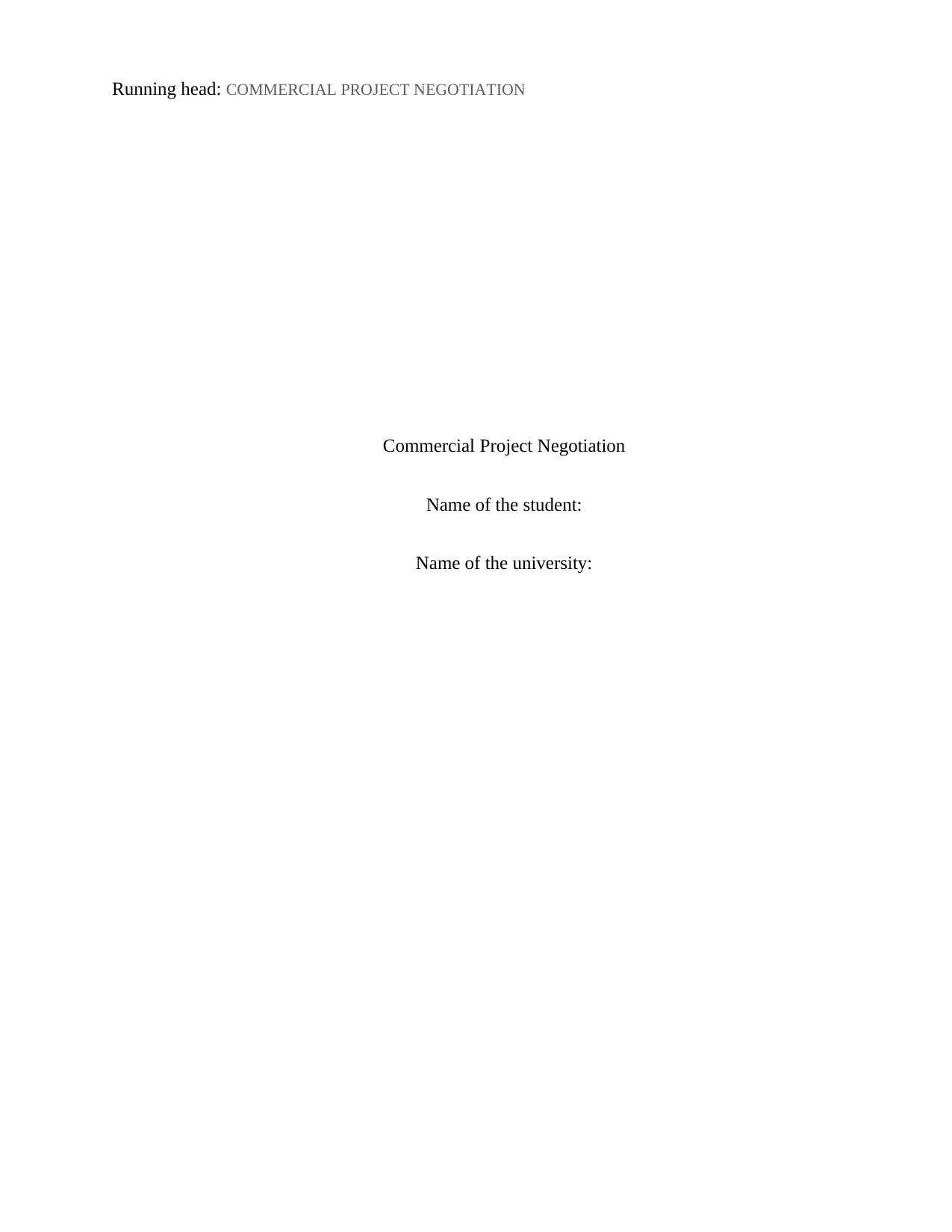
Running head: COMMERCIAL PROJECT NEGOTIATION
Commercial Project Negotiation
Name of the student:
Name of the university:
Commercial Project Negotiation
Name of the student:
Name of the university:
Paraphrase This Document
Need a fresh take? Get an instant paraphrase of this document with our AI Paraphraser
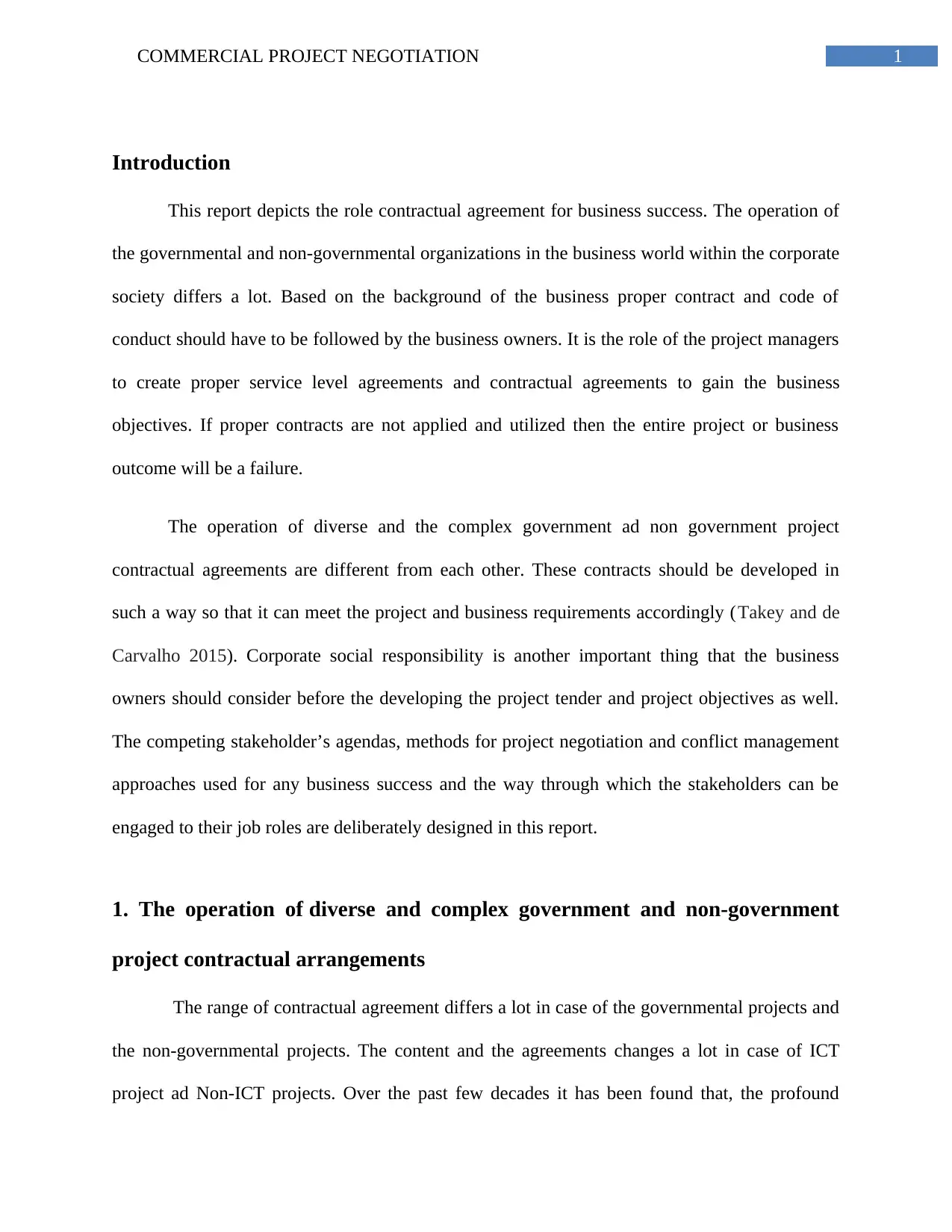
1COMMERCIAL PROJECT NEGOTIATION
Introduction
This report depicts the role contractual agreement for business success. The operation of
the governmental and non-governmental organizations in the business world within the corporate
society differs a lot. Based on the background of the business proper contract and code of
conduct should have to be followed by the business owners. It is the role of the project managers
to create proper service level agreements and contractual agreements to gain the business
objectives. If proper contracts are not applied and utilized then the entire project or business
outcome will be a failure.
The operation of diverse and the complex government ad non government project
contractual agreements are different from each other. These contracts should be developed in
such a way so that it can meet the project and business requirements accordingly (Takey and de
Carvalho 2015). Corporate social responsibility is another important thing that the business
owners should consider before the developing the project tender and project objectives as well.
The competing stakeholder’s agendas, methods for project negotiation and conflict management
approaches used for any business success and the way through which the stakeholders can be
engaged to their job roles are deliberately designed in this report.
1. The operation of diverse and complex government and non-government
project contractual arrangements
The range of contractual agreement differs a lot in case of the governmental projects and
the non-governmental projects. The content and the agreements changes a lot in case of ICT
project ad Non-ICT projects. Over the past few decades it has been found that, the profound
Introduction
This report depicts the role contractual agreement for business success. The operation of
the governmental and non-governmental organizations in the business world within the corporate
society differs a lot. Based on the background of the business proper contract and code of
conduct should have to be followed by the business owners. It is the role of the project managers
to create proper service level agreements and contractual agreements to gain the business
objectives. If proper contracts are not applied and utilized then the entire project or business
outcome will be a failure.
The operation of diverse and the complex government ad non government project
contractual agreements are different from each other. These contracts should be developed in
such a way so that it can meet the project and business requirements accordingly (Takey and de
Carvalho 2015). Corporate social responsibility is another important thing that the business
owners should consider before the developing the project tender and project objectives as well.
The competing stakeholder’s agendas, methods for project negotiation and conflict management
approaches used for any business success and the way through which the stakeholders can be
engaged to their job roles are deliberately designed in this report.
1. The operation of diverse and complex government and non-government
project contractual arrangements
The range of contractual agreement differs a lot in case of the governmental projects and
the non-governmental projects. The content and the agreements changes a lot in case of ICT
project ad Non-ICT projects. Over the past few decades it has been found that, the profound
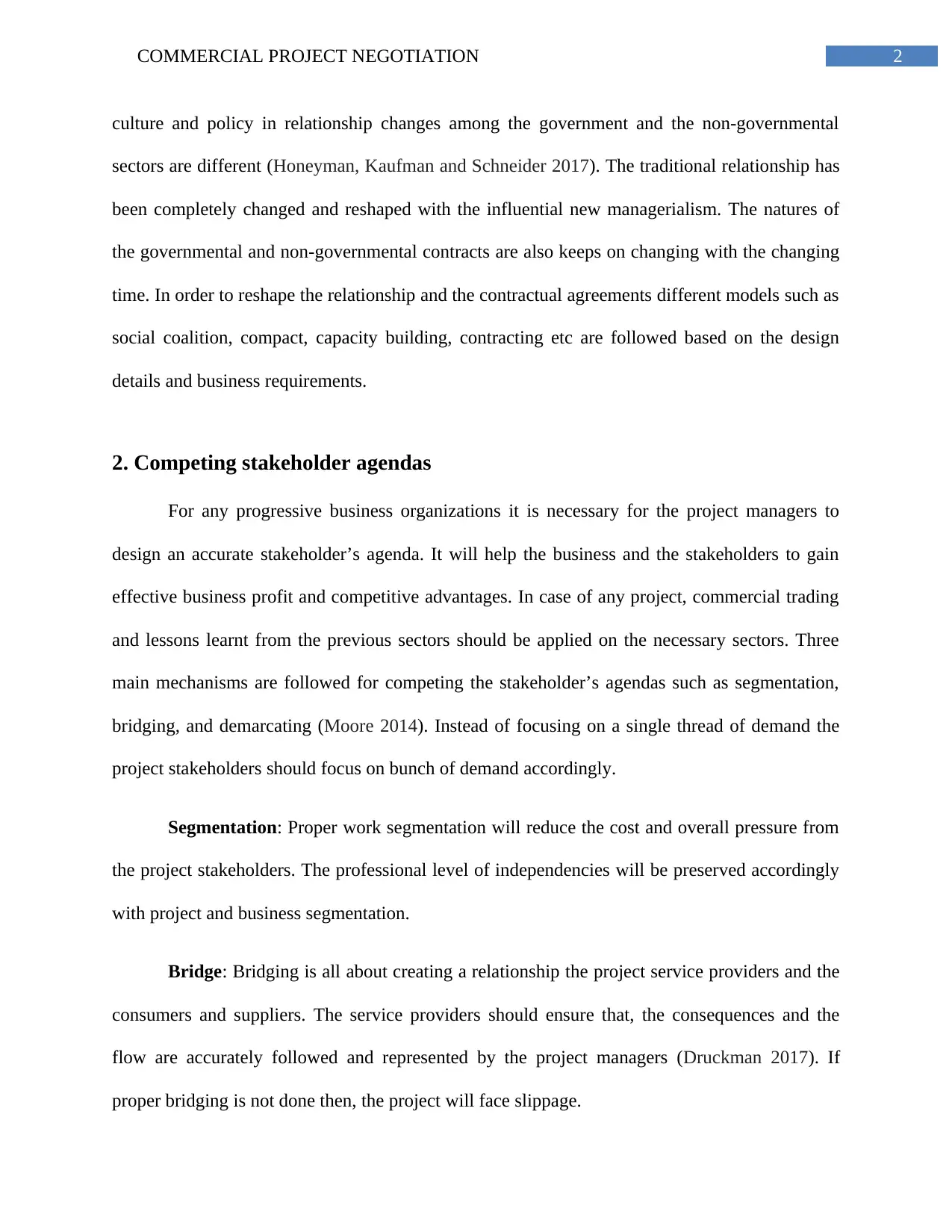
2COMMERCIAL PROJECT NEGOTIATION
culture and policy in relationship changes among the government and the non-governmental
sectors are different (Honeyman, Kaufman and Schneider 2017). The traditional relationship has
been completely changed and reshaped with the influential new managerialism. The natures of
the governmental and non-governmental contracts are also keeps on changing with the changing
time. In order to reshape the relationship and the contractual agreements different models such as
social coalition, compact, capacity building, contracting etc are followed based on the design
details and business requirements.
2. Competing stakeholder agendas
For any progressive business organizations it is necessary for the project managers to
design an accurate stakeholder’s agenda. It will help the business and the stakeholders to gain
effective business profit and competitive advantages. In case of any project, commercial trading
and lessons learnt from the previous sectors should be applied on the necessary sectors. Three
main mechanisms are followed for competing the stakeholder’s agendas such as segmentation,
bridging, and demarcating (Moore 2014). Instead of focusing on a single thread of demand the
project stakeholders should focus on bunch of demand accordingly.
Segmentation: Proper work segmentation will reduce the cost and overall pressure from
the project stakeholders. The professional level of independencies will be preserved accordingly
with project and business segmentation.
Bridge: Bridging is all about creating a relationship the project service providers and the
consumers and suppliers. The service providers should ensure that, the consequences and the
flow are accurately followed and represented by the project managers (Druckman 2017). If
proper bridging is not done then, the project will face slippage.
culture and policy in relationship changes among the government and the non-governmental
sectors are different (Honeyman, Kaufman and Schneider 2017). The traditional relationship has
been completely changed and reshaped with the influential new managerialism. The natures of
the governmental and non-governmental contracts are also keeps on changing with the changing
time. In order to reshape the relationship and the contractual agreements different models such as
social coalition, compact, capacity building, contracting etc are followed based on the design
details and business requirements.
2. Competing stakeholder agendas
For any progressive business organizations it is necessary for the project managers to
design an accurate stakeholder’s agenda. It will help the business and the stakeholders to gain
effective business profit and competitive advantages. In case of any project, commercial trading
and lessons learnt from the previous sectors should be applied on the necessary sectors. Three
main mechanisms are followed for competing the stakeholder’s agendas such as segmentation,
bridging, and demarcating (Moore 2014). Instead of focusing on a single thread of demand the
project stakeholders should focus on bunch of demand accordingly.
Segmentation: Proper work segmentation will reduce the cost and overall pressure from
the project stakeholders. The professional level of independencies will be preserved accordingly
with project and business segmentation.
Bridge: Bridging is all about creating a relationship the project service providers and the
consumers and suppliers. The service providers should ensure that, the consequences and the
flow are accurately followed and represented by the project managers (Druckman 2017). If
proper bridging is not done then, the project will face slippage.
⊘ This is a preview!⊘
Do you want full access?
Subscribe today to unlock all pages.

Trusted by 1+ million students worldwide
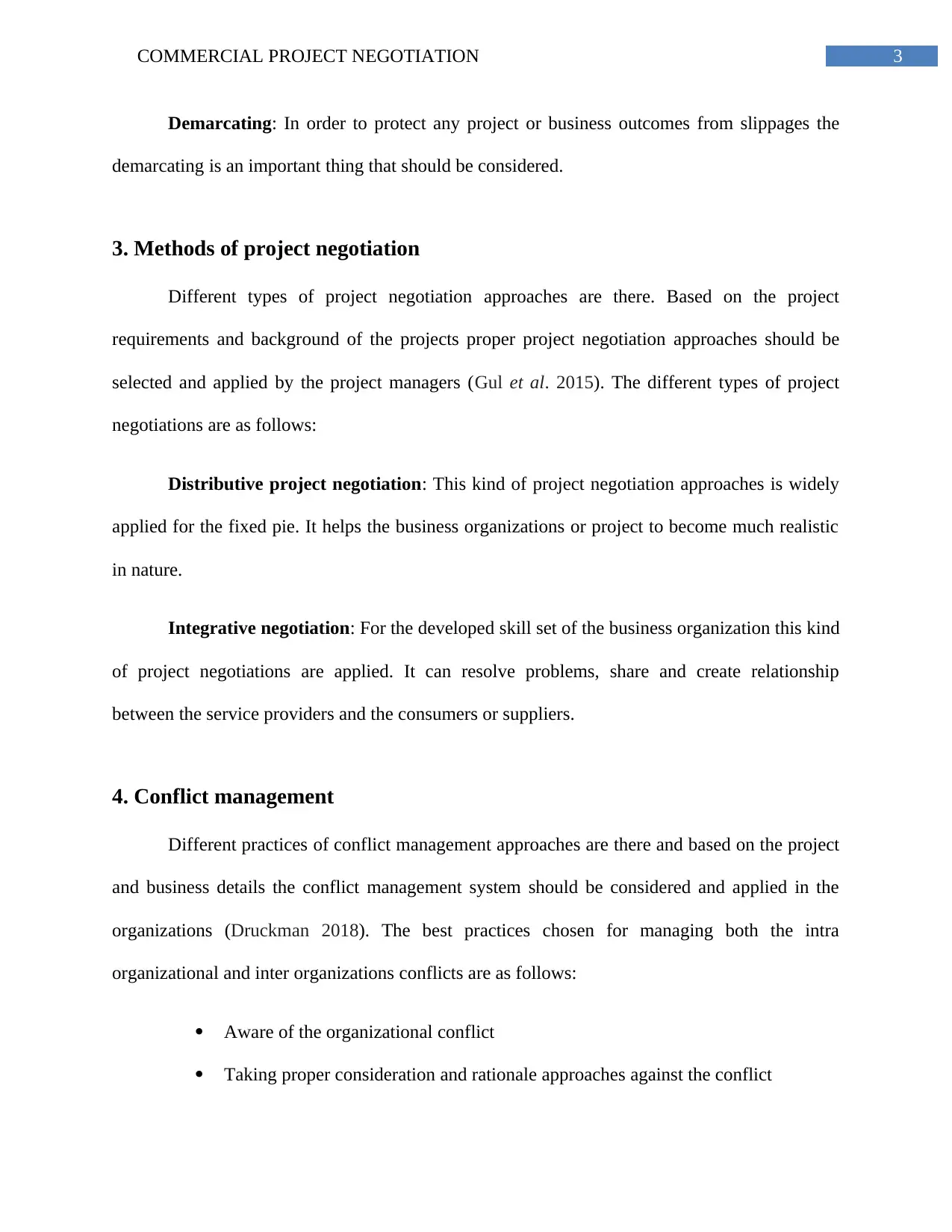
3COMMERCIAL PROJECT NEGOTIATION
Demarcating: In order to protect any project or business outcomes from slippages the
demarcating is an important thing that should be considered.
3. Methods of project negotiation
Different types of project negotiation approaches are there. Based on the project
requirements and background of the projects proper project negotiation approaches should be
selected and applied by the project managers (Gul et al. 2015). The different types of project
negotiations are as follows:
Distributive project negotiation: This kind of project negotiation approaches is widely
applied for the fixed pie. It helps the business organizations or project to become much realistic
in nature.
Integrative negotiation: For the developed skill set of the business organization this kind
of project negotiations are applied. It can resolve problems, share and create relationship
between the service providers and the consumers or suppliers.
4. Conflict management
Different practices of conflict management approaches are there and based on the project
and business details the conflict management system should be considered and applied in the
organizations (Druckman 2018). The best practices chosen for managing both the intra
organizational and inter organizations conflicts are as follows:
Aware of the organizational conflict
Taking proper consideration and rationale approaches against the conflict
Demarcating: In order to protect any project or business outcomes from slippages the
demarcating is an important thing that should be considered.
3. Methods of project negotiation
Different types of project negotiation approaches are there. Based on the project
requirements and background of the projects proper project negotiation approaches should be
selected and applied by the project managers (Gul et al. 2015). The different types of project
negotiations are as follows:
Distributive project negotiation: This kind of project negotiation approaches is widely
applied for the fixed pie. It helps the business organizations or project to become much realistic
in nature.
Integrative negotiation: For the developed skill set of the business organization this kind
of project negotiations are applied. It can resolve problems, share and create relationship
between the service providers and the consumers or suppliers.
4. Conflict management
Different practices of conflict management approaches are there and based on the project
and business details the conflict management system should be considered and applied in the
organizations (Druckman 2018). The best practices chosen for managing both the intra
organizational and inter organizations conflicts are as follows:
Aware of the organizational conflict
Taking proper consideration and rationale approaches against the conflict
Paraphrase This Document
Need a fresh take? Get an instant paraphrase of this document with our AI Paraphraser
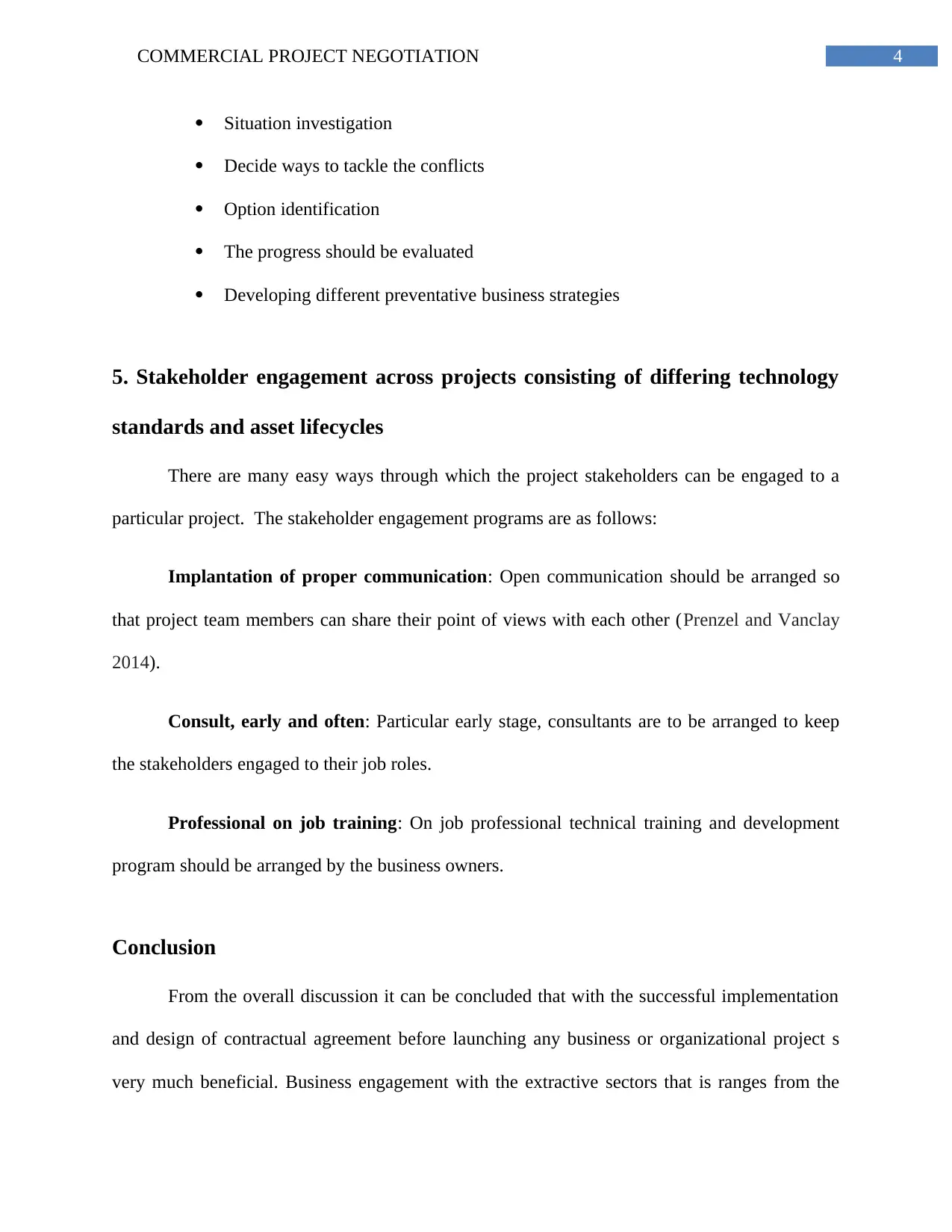
4COMMERCIAL PROJECT NEGOTIATION
Situation investigation
Decide ways to tackle the conflicts
Option identification
The progress should be evaluated
Developing different preventative business strategies
5. Stakeholder engagement across projects consisting of differing technology
standards and asset lifecycles
There are many easy ways through which the project stakeholders can be engaged to a
particular project. The stakeholder engagement programs are as follows:
Implantation of proper communication: Open communication should be arranged so
that project team members can share their point of views with each other (Prenzel and Vanclay
2014).
Consult, early and often: Particular early stage, consultants are to be arranged to keep
the stakeholders engaged to their job roles.
Professional on job training: On job professional technical training and development
program should be arranged by the business owners.
Conclusion
From the overall discussion it can be concluded that with the successful implementation
and design of contractual agreement before launching any business or organizational project s
very much beneficial. Business engagement with the extractive sectors that is ranges from the
Situation investigation
Decide ways to tackle the conflicts
Option identification
The progress should be evaluated
Developing different preventative business strategies
5. Stakeholder engagement across projects consisting of differing technology
standards and asset lifecycles
There are many easy ways through which the project stakeholders can be engaged to a
particular project. The stakeholder engagement programs are as follows:
Implantation of proper communication: Open communication should be arranged so
that project team members can share their point of views with each other (Prenzel and Vanclay
2014).
Consult, early and often: Particular early stage, consultants are to be arranged to keep
the stakeholders engaged to their job roles.
Professional on job training: On job professional technical training and development
program should be arranged by the business owners.
Conclusion
From the overall discussion it can be concluded that with the successful implementation
and design of contractual agreement before launching any business or organizational project s
very much beneficial. Business engagement with the extractive sectors that is ranges from the
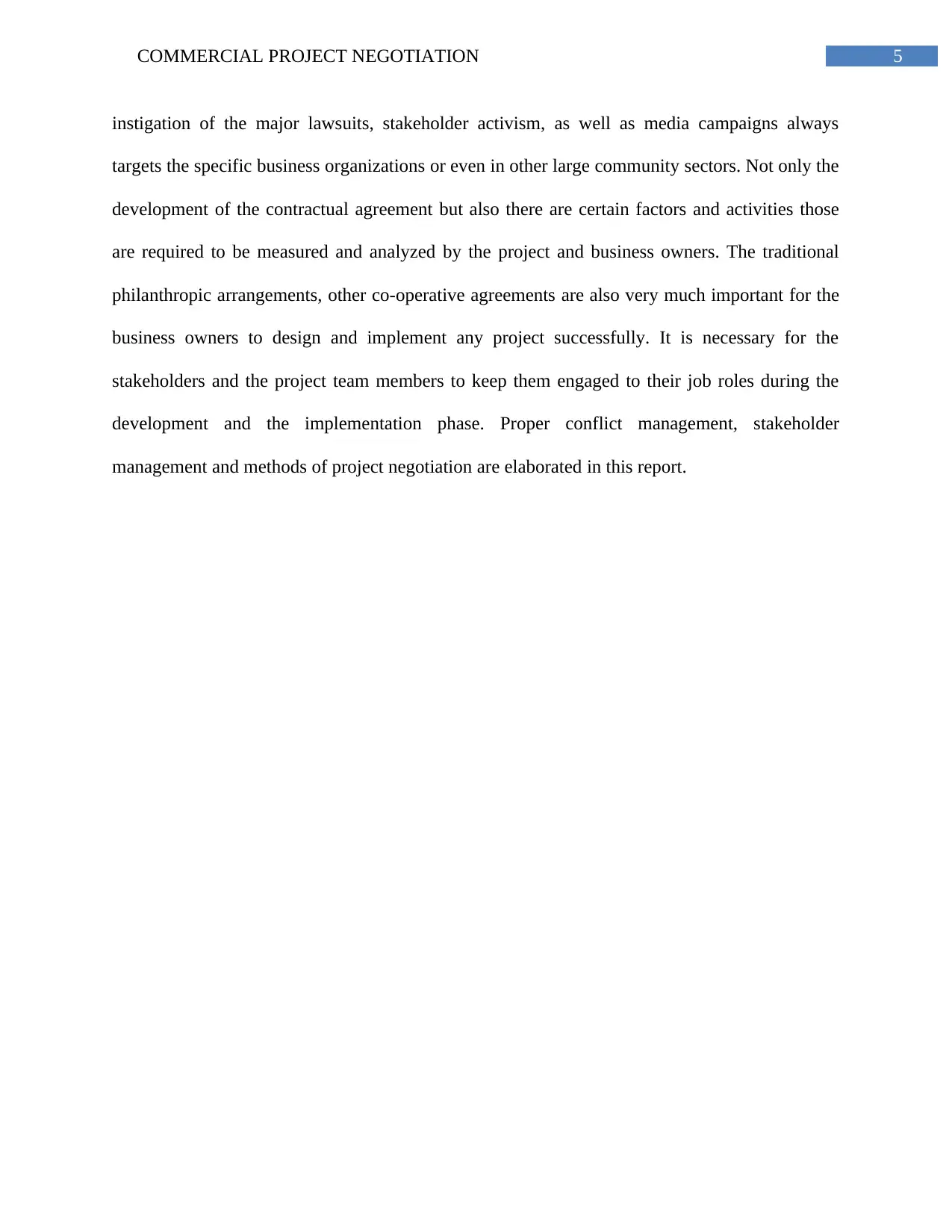
5COMMERCIAL PROJECT NEGOTIATION
instigation of the major lawsuits, stakeholder activism, as well as media campaigns always
targets the specific business organizations or even in other large community sectors. Not only the
development of the contractual agreement but also there are certain factors and activities those
are required to be measured and analyzed by the project and business owners. The traditional
philanthropic arrangements, other co-operative agreements are also very much important for the
business owners to design and implement any project successfully. It is necessary for the
stakeholders and the project team members to keep them engaged to their job roles during the
development and the implementation phase. Proper conflict management, stakeholder
management and methods of project negotiation are elaborated in this report.
instigation of the major lawsuits, stakeholder activism, as well as media campaigns always
targets the specific business organizations or even in other large community sectors. Not only the
development of the contractual agreement but also there are certain factors and activities those
are required to be measured and analyzed by the project and business owners. The traditional
philanthropic arrangements, other co-operative agreements are also very much important for the
business owners to design and implement any project successfully. It is necessary for the
stakeholders and the project team members to keep them engaged to their job roles during the
development and the implementation phase. Proper conflict management, stakeholder
management and methods of project negotiation are elaborated in this report.
⊘ This is a preview!⊘
Do you want full access?
Subscribe today to unlock all pages.

Trusted by 1+ million students worldwide
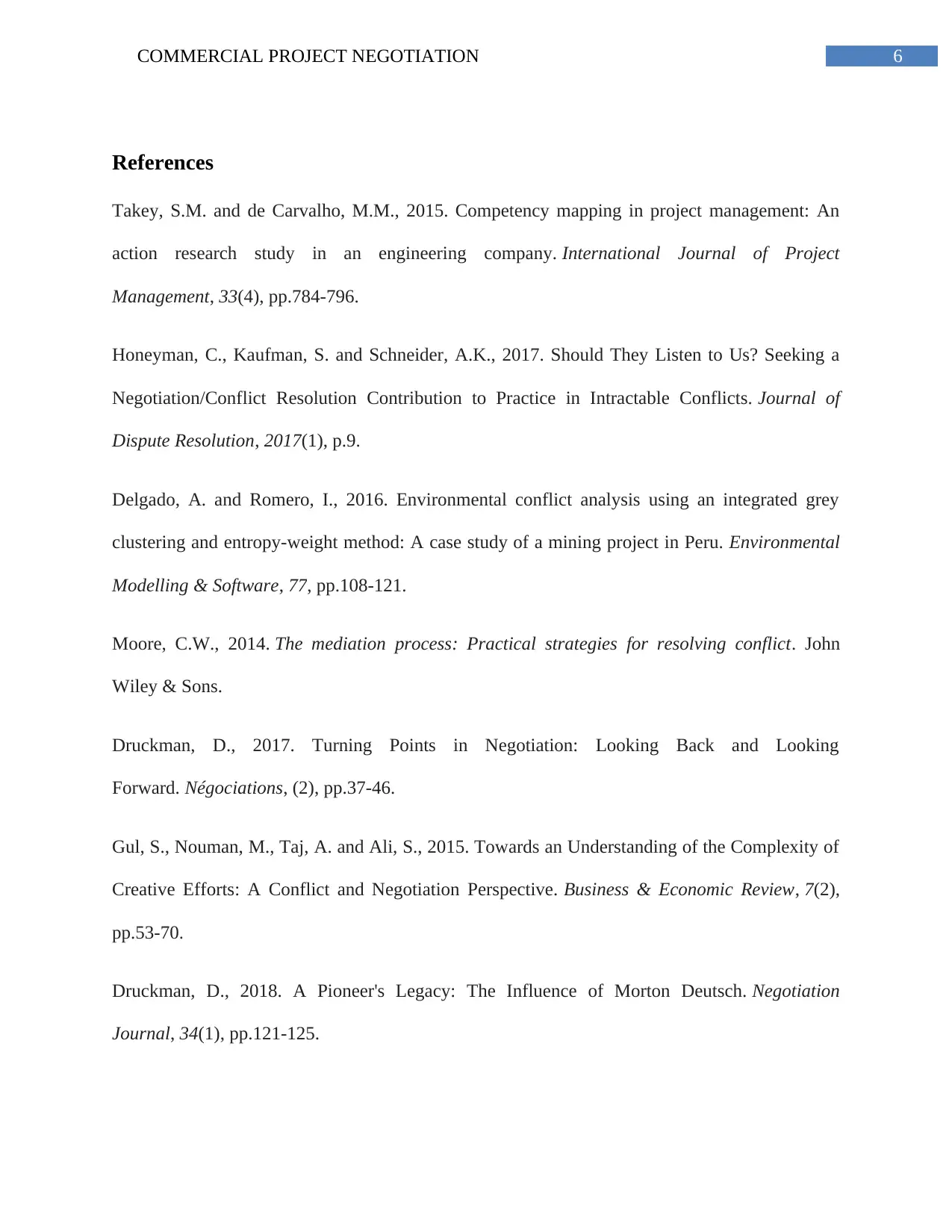
6COMMERCIAL PROJECT NEGOTIATION
References
Takey, S.M. and de Carvalho, M.M., 2015. Competency mapping in project management: An
action research study in an engineering company. International Journal of Project
Management, 33(4), pp.784-796.
Honeyman, C., Kaufman, S. and Schneider, A.K., 2017. Should They Listen to Us? Seeking a
Negotiation/Conflict Resolution Contribution to Practice in Intractable Conflicts. Journal of
Dispute Resolution, 2017(1), p.9.
Delgado, A. and Romero, I., 2016. Environmental conflict analysis using an integrated grey
clustering and entropy-weight method: A case study of a mining project in Peru. Environmental
Modelling & Software, 77, pp.108-121.
Moore, C.W., 2014. The mediation process: Practical strategies for resolving conflict. John
Wiley & Sons.
Druckman, D., 2017. Turning Points in Negotiation: Looking Back and Looking
Forward. Négociations, (2), pp.37-46.
Gul, S., Nouman, M., Taj, A. and Ali, S., 2015. Towards an Understanding of the Complexity of
Creative Efforts: A Conflict and Negotiation Perspective. Business & Economic Review, 7(2),
pp.53-70.
Druckman, D., 2018. A Pioneer's Legacy: The Influence of Morton Deutsch. Negotiation
Journal, 34(1), pp.121-125.
References
Takey, S.M. and de Carvalho, M.M., 2015. Competency mapping in project management: An
action research study in an engineering company. International Journal of Project
Management, 33(4), pp.784-796.
Honeyman, C., Kaufman, S. and Schneider, A.K., 2017. Should They Listen to Us? Seeking a
Negotiation/Conflict Resolution Contribution to Practice in Intractable Conflicts. Journal of
Dispute Resolution, 2017(1), p.9.
Delgado, A. and Romero, I., 2016. Environmental conflict analysis using an integrated grey
clustering and entropy-weight method: A case study of a mining project in Peru. Environmental
Modelling & Software, 77, pp.108-121.
Moore, C.W., 2014. The mediation process: Practical strategies for resolving conflict. John
Wiley & Sons.
Druckman, D., 2017. Turning Points in Negotiation: Looking Back and Looking
Forward. Négociations, (2), pp.37-46.
Gul, S., Nouman, M., Taj, A. and Ali, S., 2015. Towards an Understanding of the Complexity of
Creative Efforts: A Conflict and Negotiation Perspective. Business & Economic Review, 7(2),
pp.53-70.
Druckman, D., 2018. A Pioneer's Legacy: The Influence of Morton Deutsch. Negotiation
Journal, 34(1), pp.121-125.
Paraphrase This Document
Need a fresh take? Get an instant paraphrase of this document with our AI Paraphraser

7COMMERCIAL PROJECT NEGOTIATION
Prenzel, P.V. and Vanclay, F., 2014. How social impact assessment can contribute to conflict
management. Environmental Impact Assessment Review, 45, pp.30-37.
Prenzel, P.V. and Vanclay, F., 2014. How social impact assessment can contribute to conflict
management. Environmental Impact Assessment Review, 45, pp.30-37.
1 out of 8
Related Documents
Your All-in-One AI-Powered Toolkit for Academic Success.
+13062052269
info@desklib.com
Available 24*7 on WhatsApp / Email
![[object Object]](/_next/static/media/star-bottom.7253800d.svg)
Unlock your academic potential
Copyright © 2020–2026 A2Z Services. All Rights Reserved. Developed and managed by ZUCOL.





